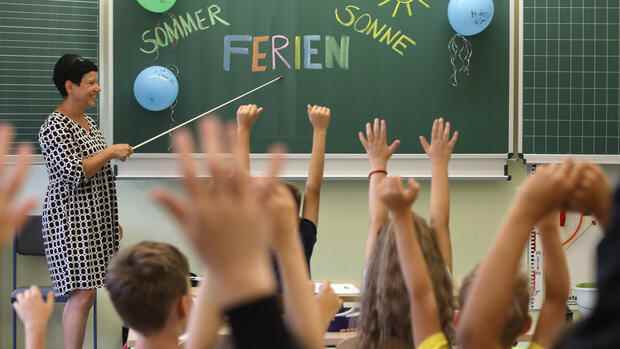A school year is done. But choosing a career is difficult for many students.
(Photo: dpa)
Berlin The majority of young people in Germany feel overwhelmed when looking for the right job and find it difficult to find their way in the information jungle. This applies above all to young people who at most achieve their secondary school leaving certificate.
Only 37 percent find the support from school, employment agencies and parents sufficient when looking for the right job. This was the result of a representative survey for the Bertelsmann Foundation among 1,666 14 to 20 year olds.
At the same time, it became apparent that so-called digital natives also want flesh-and-blood contacts. For almost half of the young people, discussions with teachers, trainers and careers advisers are the most important.
According to the authors of the study, widespread helplessness is one reason why the number of applicants on the training market has plummeted since 2020. “In the absence of clear career prospects, quite a few young people will aim to continue attending school,” writes the team led by training expert Claudia Burkard. The decision for a profession is thus “kept further and further back”.
Top jobs of the day
Find the best jobs now and
be notified by email.
“During the corona crisis, rapid digitization of career orientation was rightly called for,” says Burkard, “but for many direct experience and personal discussions are still essential”. Therefore, now that personal contacts are possible again, “more internships and company visits should take place again”.
>>Read here: Fewer young people than ever are applying for traditional training in industry or trades
Business itself also sees a need for action: “Better information for young people about their diverse career opportunities is an important challenge that the partners in vocational training must face together,” says the Deputy General Manager of the Association of German Chambers of Industry and Commerce (DIHK), Achim Dercks. According to the DIHK surveys among training companies, unclear ideas of young people are one of the biggest obstacles to training.
DIHK: “We must enable young people to do internships earlier and more intensively”
During the pandemic, the DIHK launched the “Use Your Talent” campaign – especially for disoriented young people at the end of school. “But we want and need to get even better: educational institutions, parents, politicians and we as the economy must give young people even earlier and more intensive practical insights into working life,” Dercks advertises. Because “nothing fascinates people as much as the opportunity to personally experience their own opportunities”. Often enough, an internship leads to the goal.
The Central Association of German Crafts calls for a “nationwide nationwide career orientation” as part of an “educational turnaround”. There, too, it says: Digital training fairs or virtual speed dating are good, but cannot “replace real and physical experience, for example through internships”.
Parents are the most important influencers for career choices
Even if many professions have changed rapidly and have also become digital: the most important “influencers” for young people when choosing a career are still their parents – three quarters of the young people surveyed seek their advice. School follows with 55 percent. With 36 percent, the careers advice service of the employment agency only ranks fourth, behind the internet.
However, there are big differences. Among young people with a low level of education, less than two-thirds indicated that they have parental support. “And if parents are unable to help with choosing a career, the school and the federal agency will make greater use of the discussions and advice they offer,” emphasizes Burkard. Every second person in this group also appreciates the advice of the employment agency.
Of the job portals, the Job Information Center (BIZ) of the Employment Agency is the most popular: two-thirds of young people know it. No wonder: for many schools, a visit there is part of the standard program. However, awareness is lower the higher the level of education. This supports the criticism from business that high schools in particular often only prepare their students for a degree.
Well informed in Bavaria and Mecklenburg-Western Pomerania – significantly worse in Baden-Württemberg
The enormous differences between the federal states are striking: In Bavaria and Mecklenburg-Western Pomerania, career orientation seems to be going particularly well. Here the group of young people who are satisfied with information and advice is by far the largest. At the end of the scale is Baden-Württemberg: Here the proportion is sometimes only half as high.
More: End of the “academisation mania”: The trend towards studying comes to a standstill – but this only helps the training market to a limited extent
